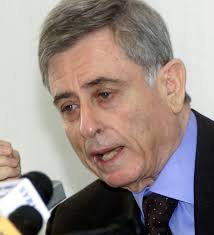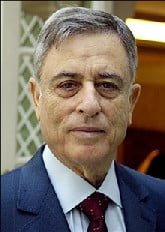Former Syrian Vice President Abdel Halim Khaddam expressed his concerns regarding the numerous conferences held by the opposition, characterizing them as a “negative phenomenon.” However, he emphasized the importance of focusing on the positive aspect, as these conferences reflect the vigor and eagerness for change among the Syrian people.
As the head of the opposition National Salvation Front, Khaddam emphasized that the assessment of any conference should come after the issuance of decisions. If these decisions align with the aspirations of the Syrian youth revolution, it is considered positive and provides moral support. On the other hand, if they are perceived as political maneuvering, both internal and external entities will reject the outcomes.
During an interview with the American radio station “Sawa,” Khaddam deemed the idea of forming a Syrian shadow government as impractical. He explained that no country in the world would be willing to host a government aimed at overthrowing another regime, highlighting this as a clear principle in international relations.
Khaddam noted that historical evidence suggests that shadow governments have generally been unsuccessful, except in specific limited cases. He proposed that once the regime begins to collapse, it becomes the responsibility of the opposition to establish a body with a tangible presence within the country. This body would then organize the transition process through a conference or engage in dialogue with national entities to form a transitional government while clearly defining its responsibilities.
Khaddam criticized the discrepancies within the Syrian opposition, referring to them as “details,” despite the existence of numerous shared slogans such as the overthrow of the regime and the demand for a pluralistic civil state. He argued that any calculations outside the scope of overthrowing the regime are misguided and that Syrians should prioritize the goal of achieving change in Syria, leaving personal political ambitions behind.
The former Syrian Vice President emphasized the need for international intervention in the Syrian crisis, citing the grave challenges faced by the Syrian people, including killings, bloodshed, and destruction. He considered it crucial for the international community to assist the Syrian people in facilitating the process of transitioning from one democratic system to another.
Khaddam directed sharp criticism towards the Egyptian Secretary General of the League of Arab States, Nabil El-Araby. He described El-Araby as a mere ambassador and employee who should not provide cover to any Arab regime and accused him of surpassing his responsibilities within the Muslim world. Khaddam particularly condemned El-Araby’s recent visit to Damascus, which, in his view, demonstrated a lack of awareness regarding the televised atrocities, destruction, and humiliation occurring in Syria. He further accused El-Araby of disregarding the significant number of casualties and detainees, asserting that his statements had a negative impact on Syrians, Arab public opinion, and their perception of the situation.
Khaddam urged Nabil El-Araby to emulate the example of Mahmoud Riad and Amr Moussa, who have steadfastly adhered to national, ethical, and moral principles while upholding the Charter of the Arab League. He emphasized that despite the world’s conscience being shaken by the crimes committed in Syria, it appears that Nabil El-Araby remains unaffected. Khaddam reminded the Secretary-General of the League of Arab States of the positions expressed by the United Nations Secretary-General, Ban Ki-moon, who surprisingly called upon the international community not to interfere in Syria’s internal affairs.
The former Syrian Vice President asserted that President Bashar Al-Assad demonstrated early on in his rule that he disregarded the advice of others. This approach, according to Khaddam, has led the country to its current crisis, with an expected resolution in the near future.




